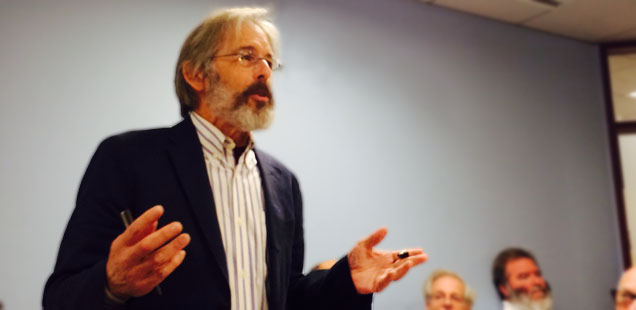Event
Hendrik Hertzberg of the New Yorker: Reform the Presidential Election System to Promote Greater Civic Health

September 16, 2014 — Hendrik “Rick” Hertzberg, senior editor at the New Yorker and longtime political commentator, returned to the Shorenstein Center to discuss reform of presidential elections, advocating revision of the Electoral College system through a new state “compact” that would honor the national popular vote.
A former Shorenstein Fellow, Hertzberg said that, in terms of our current moment of political dysfunction, one the chief explanations is the way the country has traditionally implemented the Constitution’s Electoral College structure: “So much of what’s wrong is directly traceable to that.”
But the Constitution’s framers “were at the cutting edge of political technology of their day,” Hertzberg said. Instead of worshipping America’s founders, “We should try to be like them” and innovate by changing the way states allocate their electoral votes within the system.
Hertzberg promoted a new agreement among the states — a reform called the National Popular Vote Interstate Compact — that would base the election of a U.S. president on the national popular vote, not on the current Electoral College allocation system. Eleven states have already taken steps to adopt this reform measure, each agreeing to give all of their electoral votes to the national winner of the popular vote. So far, the states that have adopted the compact are “blue states” — Democratic-leaning — so the movement’s goal is to get a “red state” to adopt it, too. If that were to happen, and others were to follow in short order, the system-wide change could potentially happen by 2016, Hertzberg said. The overall shift would not require the approval of all 50 states — just states representing 270 of the 538 Electoral College votes, in order to make it effective.
Hertzberg conceded that the compact itself is a bit of a “Rube Goldberg” solution and that it can be confusing to voters. But the mechanism is compelling once citizens understand it. “Here’s a way that we can elect the president democratically,” Hertzberg said. “We don’t have to change a word of the Constitution.”
The structural change would mean the end of “swing states,” Hertzberg said, and a greater focus on states that are frequently neglected by campaigns. It would promote greater “civic health” by helping to spur greater voter turnout, and address “the money problem,” whereby campaign spending will be spread more equally around the country. Such a change could also “build the morale of the country” and activate more political reform in other areas of American politics, he said.
Photo by Nancy Palmer and article by John Wihbey of the Shorenstein Center.